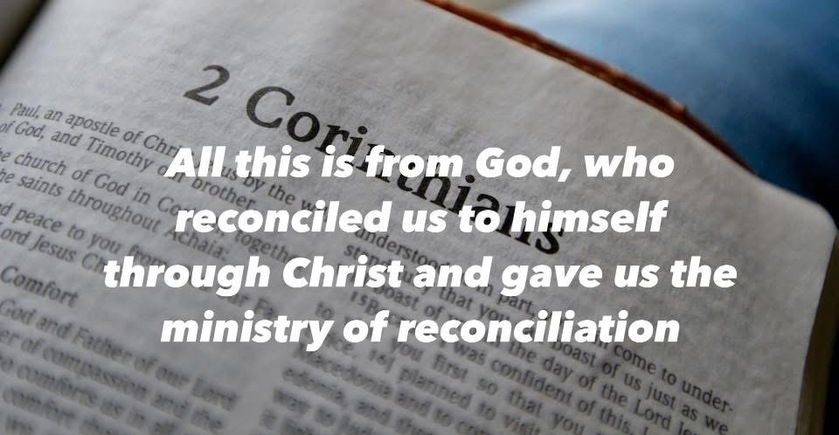The Transformative Freedom of Abiding: What Are You Seeking?
John 1:38-42
Jesus turned and saw them following and said to them, "What are you seeking?" And they said to him, "Rabbi" (which means Teacher), "where are you staying?" He said to them, "Come and you will see." So they came and saw where he was staying, and they stayed with him that day, for it was about the tenth hour [4pm]. One of the two who heard John speak and followed Jesus was Andrew, Simon Peter's brother. He first found his own brother Simon and said to him, "We have found the Messiah" (which means Christ). He brought him to Jesus. Jesus looked at him and said, "You are Simon the son of John. You shall be called Cephas" (which means Peter [rock]).
The disciples are drawn by John the Baptist’s testimony, and they are drawn to Jesus with a mix of curiosity and hope. Beginning with Andrew and his brother Simon (Peter), and followed shortly after by Philip and Nathanael. To them all Jesus says, "Follow me", "Come and see." It's interesting to see that it is Andrew who is introducing them to Jesus. It's seems that this is Andrew's ministry. He's often seen bringing people to Jesus. He's got that spirit of relational evangelism.
The scene in John 1:38-42 is electric with divine encounter. Something extraordinary has happened. By 4 p.m., Andrew, and "the other disciple" Simon, have spent hours with Jesus, and the encounter transforms them. And this is amazing to me. I don't think I've ever been this excited or energized by anyone in such a short period of time. I probably would have spent more than half that time just trying to filter everything he said through my discernment filters. And I'm sure that Peter and Andrew's curiosity wasn't far off from that same attitude in regard to their attraction. Jesus live and in-person must have been immediately profound in ways we couldn't understand today. That fullness of the Holy Spirit indwelling must have been very plain to see. In mere hours, Jesus’ presence has ignited a fire in their hearts.
Many of us might have approached Jesus with caution, analyzing His words, weighing His claims, or questioning His authority. And many did who met him even then. So, what was different about the disciples? Andrew and his brother Simon seem to bypass all the filters and are swept up instead by the undeniable reality of who Jesus is. What was it about Jesus that caused such an immediate, and profound impact on these first few disciples?
His words?
His gaze?
His very presence carrying the weight of divine love and truth?
He was the living Word, the embodiment of God’s glory (John 1:14), and knowing what I know, on a personal level, about the power of the Word and its impact upon me, I can see how terrific it must have been to meet Him face to face. His presence likely stirred their souls in ways that defied explanation, bypassing their usual defenses and awakening a deep, and spiritual recognition.
I love reading about the personal encounters that the followers have with Jesus. Each is so personal and present. Each time Jesus truly meets them in their particular and personal way. What would it look like to approach Jesus with the same open-hearted curiosity as Andrew, allowing His Spirit to transform us in just a moment?
While we don’t meet Him in the flesh as Andrew did, the Holy Spirit still draws us into His presence through prayer, Scripture, and worship. Jesus’ indwelling by the Holy Spirit (John 3:34) made His presence uniquely compelling. His words carried life (John 6:63), and His love pierced hearts. And that very same Spirit is available even now for those who love God.
So, what does it mean to love God?
Jesus Himself defines this in John 14:15
"If you love me, you will keep my commandments."
But this obedience flows from a deeper relational reality. It's not like he means to say we should love a religious duty, especially since no one ever keeps those commandments perfectly.
In Mark 12:30, Jesus says,
"You shall love the Lord your God with all your heart and with all your soul and with all your mind and with all your strength."
Loving God is holistic, engaging all of our emotions, our will, intellect, and our actions. It's more personal than just a rote religious experience. It’s a passionate pursuit of Him, like Andrew’s eagerness to follow Jesus. Practically, this means offering God our affections (heart) through worship, our decisions (soul) through surrender, our thoughts (mind) through studying His Word, and our energy (strength) through serving others. And not particularly or perfectly in that order. Honestly, I don't think it's right to impose a particular order to any of it. I think it's far more personal than that. I think the most important aspect of any of it is that we must endure and abide in that relationship.
Jesus describes fruitful love for God as abiding in Him: John 15:5
"Whoever abides in me and I in him, he it is that bears much fruit"
I think connection is what it all really boils down to. I think that's what Jesus is driving at when he says, "come and see".
Loving God isn’t a formula or a checklist but a dynamic, relational pursuit that flows from abiding in Him. Jesus met Andrew, Simon, Philip, and Nathanael in ways tailored to their hearts, and He meets us the same way. This personal connection, sustained by the Holy Spirit, allows love to take countless forms. A moment of worship (heart) might lead to a decision to serve (strength), which deepens understanding of Scripture (mind). The Holy Spirit orchestrates this dance, and abiding keeps us connected to the source, Jesus Himself.
When we say, "abide", what do we mean?
The word “abide” in John 15:5 comes from the Greek meno, meaning to remain, stay, dwell, or continue. In short, live in it. Abiding is more than a passive state, it’s an active, relational commitment to stay connected to Him. Jesus describes this connection in the imagery of a vine and remaining grafted into that vine. As a horticulture expert I love this idea. Like a branch remains attached to the vine (John 15:1-4), abiding is both intimate in the immediate connection and enduring in the life-giving force that flows through that connection. Like Andrew lingering with Jesus until 4 p.m., abiding involves staying close to Him through prayer, Scripture, worship, or quiet reflection. It’s choosing to dwell in His love, even amidst life’s distractions or challenges.
Abiding is trusting His Spirit to sustain us, much like the branch relies on the vine for nourishment.
Jesus said: John 15:9
"Abide in my love"
It means letting His love shape your emotions, decisions, and actions. Pouring out your affections in worship. Surrendering your tough decisions to Jesus, trusting His guidance as you remain in prayer through the Holy Spirit. And loving his word, dwelling in His Word, for instance letting a verse like John 15:5 sink deep into your thoughts.
This is what it means to endure in our faith. Abiding embodies this endurance. It’s not a one-time act but a continual choice to stay connected, even in doubt, busyness, or suffering.
Andrew and the other disciples accepted Jesus’ in-person call by spending hours with Him, and their abiding led to their transformation. Today, we abide by accepting the same invitation, entering Jesus’ presence through the Holy Spirit. We meditate in scripture, sing in worship, and share Jesus with someone like Andrew does. The Holy Spirit, who filled Jesus (John 3:34), now dwells in us (John 14:17), and He makes abiding possible.
Abiding looks different for each person. That's the freedom Jesus promised. He invites us into a relationship, not a rigid rulebook. A relationship with Him that liberates us to love God authentically.
In John 8:36, Jesus declares,
"If the Son sets you free, you will be free indeed."
This freedom includes the liberty to abide in ways that resonate with who you are. But remember, it's a transformative freedom. This isn’t just freedom from sin or external constraints but a liberation to live fully in relationship with Him. What that means is, abiding in Christ is the liberty to abide in ways that resonate with who we are. This is how Christianity has flourished throughout human history. But it does come with its dangers.
Those freedoms can be taken to an extreme that becomes wickedness. And often this happens. Pride usually creates this sort of thing. We are wired to be prideful and love comparing ourselves to others. And this Christian freedom can fan those flames of pride. We see it all the time. I think this happens when we refuse to let the Holy Spirit complete the transformation. We instead take on the mantle and make it transform to our own agenda. We block the Spirit, we box Him out, we build walls of separation. And we build doctrines around our free agency in Christ. His love becomes our nature. It's no longer "in Him" it's about "us" and what we truly love. Whatever that is.
So, what does this reality check mean?
It means that our freedom in Christ can either abide in Him or it can become something completely different. This freedom, when misused, can veer into prideful wickedness, blocking the Holy Spirit’s transformative work and twisting God’s love into a self-centered agenda.
Andrew’s abiding in John 1:38-42 shows how freedom, rooted in Jesus, sparks transformation that blesses others. But don't fear the tension between liberty and transformation. Let transformation inspire you to abide authentically, trusting the Spirit to guard against your sinful pride. Recognize it, and isolate it by confessing it in humility. The answer to pride is humility. And that's not a weakness, because it takes great character and strength to resolve to overcome yourself.
Abide in Jesus with an open heart and mind, "come and see" Him transform your life.




















